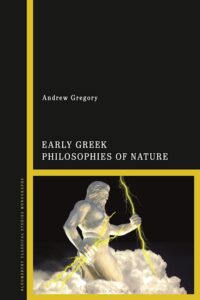 Over the past year I’ve been dedicating a substantial portion of my reading hours to the biological works of Aristotle, as well as the Timaeus of Plato in order to improve my understanding the history of the early development of natural philosophy – what would eventually become natural history. However in most every one of these works, reference is made to the ideas of those who came before. In some cases these are little more than names to us today. Even those who are well-read in ancient philosophy might be unfamiliar with what is known of the ideas of many pre-Socratic philosophers such as Anaxaminder, Anaxamines, and Leucippas.
Over the past year I’ve been dedicating a substantial portion of my reading hours to the biological works of Aristotle, as well as the Timaeus of Plato in order to improve my understanding the history of the early development of natural philosophy – what would eventually become natural history. However in most every one of these works, reference is made to the ideas of those who came before. In some cases these are little more than names to us today. Even those who are well-read in ancient philosophy might be unfamiliar with what is known of the ideas of many pre-Socratic philosophers such as Anaxaminder, Anaxamines, and Leucippas.
Fortunately, for curious classicists with an interest in natural history, or curious naturalists with an interest in ancient classics, Prof. Andrew Gregory’s new book Early Greek Philosophies of Nature has now been published in the Bloomsbury Classical Studies Monographs series.
Presenting very helpful explanations and examinations of pre-Socratic natural philosophy dating back to those ideas found in Homer and Hesiod, through Leucippus and Democritus, and on up to Socratic contemporaries and later with the Hippocratic authors, Prof. Gregory explores how these ancient thinkers proposed that the universe came into being (or if it in fact did), how they conceived of a regulated and ordered cosmos, how much we may have over-emphasized some of their ideas on these matters, and how much we may have underestimated others.
While Early Greek Philosophies of Nature may be a bit esoteric for some, if you, like me, are interested in the beginnings of what eventually became natural history, then this is a book very much worth investigating.
If you enjoyed reading this, please consider signing up for The Well-read Naturalist's newsletter. You'll receive a helpful list of recently published reviews, short essays, and notes about books in your e-mail inbox once each fortnight.
